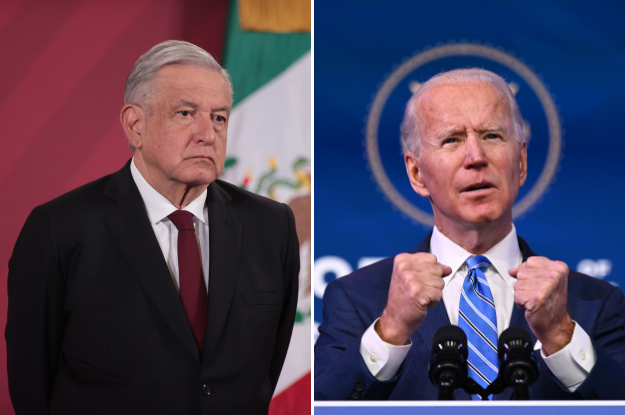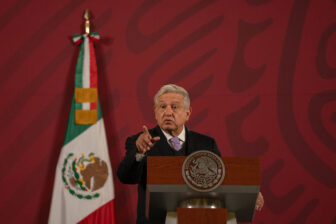MEXICO CITY – Mexico and the United States find themselves on the cusp of an unusual power transition in Washington, one that has put the future of the bilateral relationship in doubt. Mexico has been forced to navigate four years of the most anti-Mexican administration in recent memory, and Joe Biden’s inauguration thus represents a unique opportunity for both countries to reset their relationship and approach issues such as trade, immigration and security from a new perspective, burying the dismal legacy of Donald Trump. Still, President Andrés Manuel López Obrador, widely known as AMLO, has already sent a series of confusing messages to the Biden team. Both sides will need to tread carefully in order to avoid a disaster.
AMLO is a pragmatist who understands the bilateral relationship’s relevance for Mexico. Thus, at the onset of his government in 2018, he decided to maintain the spirit of U.S.-Mexico cooperation begun by his predecessor, Enrique Peña Nieto, by hardening his posture on migration and embracing NAFTA renegotiations. In practice, AMLO ended up pursuing relations with Trump that were both closer and milder than those he had promised in his book Oye, Trump (“Hey, Trump”). The two leaders had more personal chemistry than either expected, but international commentators who say AMLO liked Trump’s focus on national “sovereignty” appear to have forgotten the way he threatened Mexico with tariffs and other punitive measures on numerous occasions. To say AMLO will “miss” Trump is surely an overstatement. No, AMLO will not miss Trump, but will have to work hard to gain Biden’s trust.
Biden offers an opportunity for a relationship more aligned with Mexican interests. That’s why AMLO’s delay in recognizing his election win has been viewed by many as a diplomatic blunder, one that has triggered waves on both sides of the border and gotten the personal relationship off to a rough start. Though he has already made a direct phone call to Biden, AMLO needs to seek out an in-person meeting with Biden as soon as possible in order to align positions, build chemistry and start the relationship anew.
Even with such gestures, though, clouds loom on the horizon, especially with regards to security. First, to the surprise of Washington as well as many in Mexico, AMLO has offered political asylum to Julian Assange. The offer is mostly symbolic – Assange cannot get to Mexico in practice – and it is best understood as a nod to the Latin American left, for whom Assange is something of a hero. Ecuadorian President Lenín Moreno’s decision to deliver the WikiLeaks founder to British legal authorities has been seen by this anti-imperialist, anti-U.S. group as a betrayal. At a time when AMLO’s credentials as a leftist have been questioned because of a range of policies, this was a chance to reassert himself in a regional context.
The recent debacle involving former Mexican Secretary of Defense General Salvador Cienfuegos is an even hotter and more complex topic. Just days prior to the end of Donald Trump’s presidency, the U.S. Justice Department complained to the Mexican government over the publication of a dossier on Cienfuegos compiled by the U.S. Drug Enforcement Agency (DEA). The publication puts the immediate future of intelligence cooperation between the two countries in question. For his part, AMLO has accused the DEA of fabricating the crimes alleged against Cienfuegos, and the Mexican attorney general has thus dismissed all charges against the general.
The governments of Mexico and the United States have had to deal with a long history of mutual distrust in the areas of security and intelligence. For any country, such close proximity to what remains the most powerful military and economy of the world would present risks and challenges, as well as opportunities. The arrest of Cienfuegos in a Los Angeles airport last October, a move undertaken without alerting the Mexican government, as well as the Mexican government’s decision to publish more than 700 pages of the DEA’s dossier on the general, are evidence of the complexity of the relationship between the two governments and the multiple agencies and departments involved. Both governments have violated bilateral accords in this case. Both defend the idea of national interest and sovereignty. Both will need to alter their positions.
The Joe Biden administration needs to change the focus and tone of the security relationship, recognizing that the war on drugs has failed and policy is already beginning to change in practice, even if saying so out loud remains taboo in some quarters. The prohibitionist paradigm is quickly eroding at the state and local level in the United States and is quickly being overtaken by one of market regulation. This spring, it is expected that Mexico will do the same for cannabis markets and that prohibitionism will thus begin to fall on the Mexican side as well. Insisting on drug seizures, on the capture of drug lords and on reactivating the Mérida Initiative instead of radically reforming the current approach to the problem will only result in more deaths, more violence and more militarization on the Mexican side, ensuring that drugs of dubious quality continue to flow illegally into the U.S. In Mexico, public opinion favors the regulation of marijuana, suggesting some kind of change is coming.
With respect to migration, there exists an enormous opportunity for both countries. The U.S. immigration system is broken and has not seen real reform in at least four decades. The Immigration Reform and Control Act (IRCA) of 1986 was perhaps the most recent attempt at intensive reform of the system, and since then all bipartisan efforts at comprehensive immigration reform have failed. The Obama-Biden administration registered even more deportations than the government of George W. Bush. Barack Obama failed in his promise to improve the system. The Latino vote has taken on more and more electoral weight and has favored the Democratic party for decades.
With the Democrats in control of Congress, President Biden now has the opportunity to present comprehensive immigration reform. It is now possible to end the Remain in Mexico program, end the practice of separating immigrant families, and continue legislative efforts to ensure so-called Dreamers are no longer one executive order away from losing their status. In this light, there is reason for optimism. Hispanic representatives such as Chuy García, local legislators such as Cesar Chavez, migrant organization leaders such as Manuel Martinez and many others see an opportunity to reform the system. Biden should press the reset button and bury the last four years of anti-immigrant policies under Trump. The wall narrative should be swapped out for one of cooperation for the development of Central America, the shared prosperity of North America and orderly and safe migration. To this end, AMLO and the Biden government will be able to understand one another and work together.
Finally, in the summer of last year, a new trade deal between Mexico, the U.S. and Canada took effect. The renegotiation period involved two Mexican governments and demonstrated the knowledge and professionalization of Mexican negotiators. The AMLO government quashed doubts over whether or not it supports the free trade model of economic development, leaning heavily on its political capital with the Mexican left in order to defend renegotiation rather than abandoning the open economy model that has turned Mexico into a major world trade power and one of the United States’ top trade partners.
But there are at least two speed bumps ahead in terms of trade. AMLO’s energy policy, in addition to being based on hydrocarbons rather than clean energy, also privileges state monopolies rather than encouraging competition. The president’s lack of trust in private organs in the area of telecommunications is also cause for alarm, and the Mexican government may not only spook investors but also find itself swamped in legal claims for noncompliance with articles of the new United States–Mexico–Canada Agreement (USMCA). AMLO must press the reset button for his energy policy, embracing clean energy and respecting the terms of Mexico’s most important trade deal.
In 2009, then-Secretary of State Hillary Clinton and her Russian counterpart Sergey Lavrov took a photo together, the two smiling wide alongside a red reset button, a symbol of their intention to reset the bilateral relationship. The story is best known for the translation error on the button Clinton first brought Lavrov, but even Biden himself recognized, as vice president, that the reset functioned until Russian’s 2014 invasion of Crimea.
Today, Foreign Minister Marcelo Ebrard could present his U.S. counterpart Anthony Blinken with a red reset button, and Presidents Biden and López Obrador could sit down together to dispel doubts around what could be a cordial relationship. AMLO is a pragmatist and understands the vital importance of the relationship between the U.S. and Mexico. As much as Biden may want to see the U.S. return to the global stage and rebuild transatlantic and transpacific relations, Mexico is not only the U.S.’s most important neighbor and trade partner, but the two will also meet each other on the United Nations Security Council, and there will be no control of the COVID-19 pandemic if Mexico and the U.S. do not coordinate with one another.
The alternate path could be a continued road to disaster, in which the Mexico-U.S. relationship returns to the acrimony and mistrust that characterized previous decades prior to the 1980s. No one wants that – not AMLO, not Biden, and not the citizens of either country. This is the way to bury the Trump era and build a new future together between Mexico and the United States.








